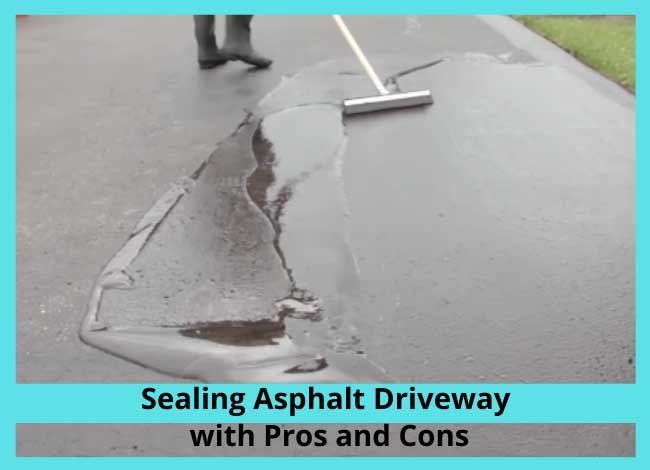Last Updated on June 22, 2021
Whether you have got an asphalt or concrete driveway, sealing it will prolong its lifespan. But since an asphalt driveway is cheaper to install, many people opt for it rather than concrete. Proper sealing of an asphalt driveway helps to protect the driveway from the elements and provides equal durability to concrete.
Elements like the sun, moisture, oil, freezing, and thawing ice take a toll on the driveway and deteriorate. However, if you seal your driveway correctly, it can last somewhere between 3 and 5 years. Ensure to follow the proper steps and methods to install and seal your driveway with the best asphalt sealer for longevity.
If you seal the driveway properly, you will secure it from cracks, plants, and even potholes. So, if you’re undecided whether to seal your asphalt driveway, these pros and cons will help you to make up your mind.
Pros of sealing asphalt driveway
It prolongs the lifespan of the driveway.
The first advantage of sealing an asphalt driveway is that it prolongs the lifespan of your driveway. If the driveway is not sealed from the elements, such as the sun, moisture, chemicals, and oil, it will deteriorate quickly and develop things like cracks and potholes. This will make your driveway unusable and risky.
Related article: How Much Driveway Sealer Do You Need to Seal The Driveway?
But when the asphalt driveway is sealed, it will prevent oxidation and cracks from happening, meaning the driveway will last longer.
Sealcoating the driveway improves its appearance.
Apart from making the driveway durable, sealing an asphalt driveway also makes it look lovely. When an asphalt driveway is first installed, it provides a deep black color that looks new and appealing to the eye. But after some time, the elements take a toll on it, resulting in a washed-out, gray, or white appearance. Also, removing grass from your asphalt driveway will improve its longevity.
However, seal coating the asphalt driveway restores this color and makes your driveway look beautiful again.
It is the most cost-effective way of sealing asphalt
One of the main advantages of sealing an asphalt driveway is that it’s less costly than other driveways. Apart from that, installing an asphalt driveway is also cheaper. So, you will spend less money compared to sealing concrete or any other type of driveway.
What’s more, sealing an asphalt driveway is easy if you know the correct procedure to follow. Additionally, it would help if you had the right tools to complete the job. Therefore, you can save a lot of cash that you could have spent hiring a professional driveway sealer.
It protects the driveway from chemicals, water, and oil stains.
Another great advantage of sealing the driveway is to protect it from things like snow, salt, chemicals, oils, fluids, and even water. If the driveway is not sealed, these components can deteriorate the driveway slowly. Thus, a sealant plays a vital role in protecting your precious driveway from these components. So you should seal the new asphalt driveway in several months.
Using asphalt sealant gives you multiple options
Some types of driveways require particular types of sealants. However, that’s not the case with asphalt driveway sealer, as it accepts all kinds of asphalt sealants. It doesn’t matter if it’s warm-mix, hot-mix, cold-mix, or even glassphalt; you can apply it on your asphalt surface.
It makes your work easier.
Sealing your asphalt driveway also makes your job easier. This is because you won’t have to worry about things like water run-off and snow on your driveway. Since the sealer contains sealant, water won’t penetrate or stay stagnant on the surface but run-off. On the contrary, if it snows, you can use a shovel to skate across the driveway and move the snow with a lot of ease.
Cons of sealing asphalt driveway
It requires regular maintenance to keep it in top condition.
Even with all of these advantages of sealing the driveway, it has some setbacks. The first setback is the regular maintenance that it demands. After you’ve sealed your driveway, you will have to ensure that it’s clean. This helps to get rid of the elements on the surface. If the elements are left on the driveway for over a long period, they will still negatively impact and deteriorate the surface.
You will be required to reapply for the sealer every 2 to 3 years
Another setback is that sealing the driveway is something you will have to do after a few years. To keep your driveway looking elegant and in tip-top condition, you will have to remove the old asphalt sealer from concrete and reapply the sealer every 2 to 3 years. This is costly and time-consuming.
Sealing an asphalt needs specific weather conditions
When you want to seal your driveway, you will be required to consider the weather. If the weather is cold or rainy, you will have to wait to get warm and dry. This is vital as it helps the asphalt sealer to dry and cure properly. And if you live in a cold climate, you will have to wait until summer or when the weather is okay to apply the sealer.
A sealer doesn’t prevent all kinds of damage.
Despite applying a sealant on your asphalt driveway, it won’t stop all kinds of damage. For instance, when the temperatures outside exceed 95 degrees, this will hurt the asphalt. If a car is parked on such a surface, the tires will unintentionally damage the driveway and leave a mark on it. Hence, your driveway may end up being deformed with an uneven surface. For better durability and Longevity, you should use a Concrete driveway sealer over an Asphalt sealer.
Sealing asphalt needs patient as it has a waiting period.
Finally, sealing asphalt on your driveway isn’t for the faint-hearted. This is because you will be needed to wait for six months after installing the asphalt to seal it. And after you have sealed the first layer, you will have to wait for at least 24 hours before sealing another layer. When you’re done, you will have to wait for another 48 hours before having traffic on the driveway.
Related article: 5 easy ways to remove oil stains from a driveway
Before sealing the asphalt driveway, you will have to cover holes, uproot plants on the driveway, and thoroughly clean it. All of these chores are demanding, and some people may give up altogether.
Summary
Now that you know the pros and cons of sealing an asphalt driveway, it’s up to you to decide if you want to seal your driveway or not. Overall, the pros outweigh the cons, which is a good thing. But to avoid some of the adverse effects of the asphalt sealant, it’s best if you properly maintain the driveway so that you don’t have to seal it frequently.
Besides, it would be best if you also used an eco-friendly asphalt sealer to don’t exert a lot of harm on the environment. The best driveway sealers will also make the driveway last longer. Make the right choice, and you won’t have to regret a single day!

